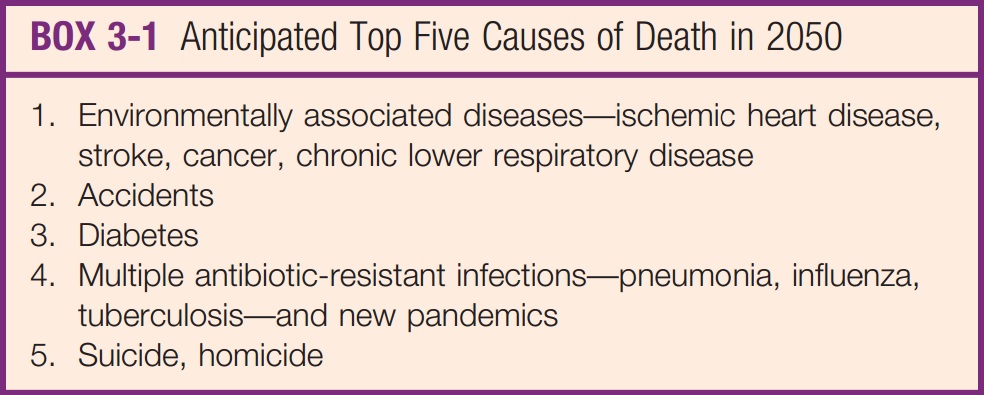Scientists Say Air Pollution Will Be Our Top Killer by 2050
Summary: Air pollution and global warming will ascend to the top cause of death in the next three decades, leading to a rise in premature deaths dues to lung disease, heart attacks, and strokes. [This article first appeared on the LongevityFacts and was updated on March 24, 2018. Author: Brady Hartman.]
A pair of expert scientists from the University of Southern California (USC) in Los Angeles says that global warming and air pollution will ascend to the top cause of death due to heart disease and stroke, cancer, and chronic lower respiratory disease.
Citing cite nearly a dozen studies on the effects of air pollution on human health, experts Caleb E. Finch, Ph.D. a molecular biologist and Edward L. Schneider, MD predict that
“environmentally associated diseases will rise to the top by 2050.”

This adds to the other scientific reports which show that air pollution readily crosses borders to affect people living in cleaner Western nations. Moreover, additional research shows that deaths due to air pollution have nearly doubled in the past eight years, causing 16% of all global deaths in 2015. An alarming trend that backstops the predictions of the USC researchers.
The USC researchers say that the coming 50% rise in fossil fuel use in the next three decades – accompanied by a similar surge in air pollution and global warming – will make our polluted environment the number one killer on the planet, surpassing all other causes of death. Finch and Schneider say
“We are deeply concerned about health consequences of the global changes in air pollution, warming, and rising coastal waters.” adding “Global fossil fuel use continues as the main source of energy into the foreseeable future, and by 2040 is predicted to increase by 50%.”
Furthermore, the USC researchers predict that global warming will bring about a small plague of insects, saying,
“Increased infections are also likely because global warming favors insect expansion.” Adding, “Furthermore, increased insect-borne infections are anticipated because the rising coastal water levels and flooding from extreme weather have expanded their breeding pools.”
The authors both reside at the University of Southern California in Los Angeles. Caleb E. Finch, Ph.D., is the ARCO-Kieschnick Professor of Gerontology, at the Davis School of Gerontology. Dr. Finch is an expert on the subject of climate change and human mortality and published a paper on the subject in 2014 in the respected peer-reviewed journal Gerontology. His coauthor Edward L. Schneider, MD is a Professor of Gerontology, Professor of Biological Sciences, and Professor of Medicine at the Keck School of Medicine.

The USC researchers published their findings in the peer-reviewed article “The Future of Old Age.” The duo point out the observation that increases in air pollution due to fossil fuel consumption leads to significantly increased deaths from heart and lung diseases, as the authors say
“Increased fossil fuel use for electric power and vehicular traffic portends further increases in air pollution, which has well-documented ill effects on lung and heart disorders. For example, household coal use in northern China since 1950 has shortened life expectancy by 5.5 years from cardiorespiratory mortality.”
Finch and Schneider point out numerous studies from top academic journals – such as the Lancet, the National Academies Press and the Proceedings of the National Academies of Science – which link increases in air pollution to corresponding increases in heart attack, known as myocardial infarction, as well as accelerated cognitive aging, which leads to Alzheimer’s disease and other forms of dementia.
Moreover, Finch and Schneider say that in addition to increased deaths from air pollution, “Global warming also affects older adults during heat waves, with higher mortality among men, as observed in the ‘killer summers’ of 1995 and 2003.” The authors predict that global warming will produce killer heat waves which will hit the elderly especially hard. Most seniors live in cities, which are much hotter than the surrounding areas.
One in Six Deaths Due to Pollution
Finch and Schneider’s bold predictions are bolstered by the October 2017 report in The Lancet, a leading journal which reported that pollution was responsible for one in six global deaths in 2015. The authors of the study published in The Lancet added that the vast majority of the deaths were caused by air pollution, a percentage that is set to escalate as we increase our burning of fossil fuels.
On their report website, pollution.org, the Lancet author’s point out that their estimates are conservative and may be on the low side, saying
“However, the data is an underestimation because accurate data is missing from many pollutants, and many severely affected countries have insufficient data.“
The Lancet report added that 92% of pollution-related casualties occur in developing countries such as India, Kenya, Pakistan, Bangladesh, Madagascar, and China.
While these countries bear the bulk of pollution-related deaths, air-pollution causes problems in cleaner Western nations as well. Particulate matter travels from one country to another, and a toxin released in China can end up in Los Angeles just as easily. In fact, researchers reported that a significant proportion of air pollution in Western US cities comes from burning coal in China.
The Lancet report estimated that nine million worldwide deaths are caused by some form of pollution, such as that found in our air, water, soil, chemical or workplace. The report fingered air pollution as the most significant contributor as it was responsible for 6.5 million fatalities in 2015.
Nature Study Shows Alarming Trend
When combined with a report from an earlier period, the Lancet report shows the number of air pollution deaths has nearly doubled in the past eight years. This year, a study published in the journal Nature and subsequently reported in PopularScience found that air pollution caused the premature deaths of 3.45 million people worldwide in 2007.
The authors of the Nature study also pointed out that air pollution doesn’t respect borders. The study found that about 12 percent of premature deaths were caused by pollution released somewhere else in the world.
PopularScience (PopSci) also interviewed Nature study co-author Qiang Zhang, a researcher at Tsinghua University in Beijing, who said
“Air pollution can travel long distances and cause health impacts in downwind regions.”
Moreover, PopSci interviewed Dabo Guan, a researcher at Tsinghua University and a co-author on the study, who said
“Previous research believed that pollution was a local issue and did not require global efforts” adding “My point here is that we’re a globally connected, intensively connected world. No one has a way out of the impact because we are either producers or consumers. Sometimes we are both.”

How Air Pollution Harms Our Health
It’s not just Finch and Schneider who say air pollution harms our health – in fact, a large body of published evidence supports the duo’s assertions.
For example, the PopSci article pointed to evidence that air pollution contributes to heart disease and stroke, chronic lower respiratory diseases, cancer, abnormal fetal development, Alzheimer’s disease, and type 2 diabetes.
Moreover, a report published yesterday on the search for breakthrough cures for respiratory diseases and COPD points out that air pollution and smoking produce the same damage and ill health. Both toxins manifest themselves as forms of accelerated lung aging that causes epigenetic changes; cellular senescence leading to so-called zombie cells, or senescent cells; mitochondrial dysfunction; stem cell exhaustion; a declining immune response; and a low-grade chronic inflammation called inflammaging.
Air pollution contains substances which generate free radicals that damage the tissues in our lungs, hearts and blood vessels. Free radicals and other toxins cause macromolecular damage to our cells, principally involving DNA damage, and telomere shortening. This damage induces cell death and cellular senescence producing the characteristic fibrotic tissue of lung disease.
Bottom Line on Air Pollution
In our bid to live longer, some of us exercise, stop smoking, take health-protecting drugs and eat a healthy diet. However, we all live on the same planet, breathing its air. Many of these lifespan-extending advances will be canceled out by the coming tsunami of global pollution.
Medical science has made significant advances towards extending human lifespan. As well, we can expect many more breakthroughs as anti-aging researchers called geroscientists bring lifespan-extending drugs to the market.
However, if we are to live to 120 and beyond in good health, we need to breathe clean air. If science is to drastically extend human lifespan, it’s not enough to cure diseases, such as cancer, type 2 diabetes, chronic lower respiratory diseases, Alzheimer’s disease, heart disease and stroke. For us to live long lives in good health, it’s crucial that we also address toxic air pollution.

What To Do About Air Pollution?
Don’t expect that all global polluters will police themselves and switch to green energy. China is the exception, and as one of the largest global polluters, it states its intention to transition to greener power production. Unfortunately, China’s legacy power plants will remain polluters, unless they are retrofitted. Moreover, even if China cleans up its all of its sources of air pollution, it still leaves India and other polluters.
To learn about pollution levels in your area, visit pollution.org. While the data is not comprehensive, it’s the best available to see what is happening in your neighborhood. As well, you can add your voice to and support to the global fight against air pollution. The pollution website is a forum for you to have your voice heard in a non-confrontational way. Your opinion will be brought into policy discussions in countries around the world.
If you want to be more proactive, you can visit a pollution advocacy website run by the closely affiliated GAHP (Global Alliance on Health and Pollution).
Related: Traces of lead causes deaths on par with smoking suggests a new study.
Related: Tougher climate policies would save 153 million lives says a new study.
Show Us Some Love
- Share this post on social media and help us spread the word – It only takes one click on any of the social media links on this page.
- Follow us on social media – Google+ | Facebook | Reddit
- Sign up for our email list – We use your email to notify you of new articles. We will not send you spam, and we will not share your email address. You can cancel at any time.
- Tell us what you think – Scroll down to enter your comments below.
References
Cover photo by Mysticsartdesign.
Finch CE, Schneider EL, “The Future of Old Age.” Copyright © 2017 by Elsevier, Inc.
Finch CE, Beltran-Sanchez H, Crimmins EM. “Uneven futures of human life spans: reckoning the realities of climate change with predictions from the Gompertz model.” Gerontology 60:183–188, 2014.
Landrigan, Philip J et al. The Lancet Commission on pollution and health. The Lancet, Volume 0, Issue 0, 19 October 2017, DOI: http://dx.doi.org/10.1016/S0140-6736(17)32345-0. Direct Link.
Sara Chodosh and Kendra Pierre-Louis. “Here’s how air pollution kills 3,450,000 people a year.” PopularScience. March 30, 2017. Link.
Qiang Zhang, Xujia Jiang, Dan Tong, Steven J. Davis, Hongyan Zhao, Guannan Geng, Tong Feng, Bo Zheng, Zifeng Lu, David G. Streets, Ruijing Ni, Michael Brauer, Aaron van Donkelaar, Randall V. Martin, Hong Huo, Zhu Liu, Da Pan, Haidong Kan, Yingying Yan, Jintai Lin, Kebin He & Dabo Guan. “Transboundary health impacts of transported global air pollution and international trade.” Nature 543, 705–709 (30 March 2017). doi:10.1038/nature21712. Link.
Mayo Clinic News Network. “Mayo Clinic Researchers Discover Link between Aging, Devastating Lung Disease.” [Press release] Mayo Clinic News Network, February 24, 2017. Link.
Peter J. Barnes. “Senescence in COPD and Its Comorbidities.” Annual Review of Physiology Vol. 79:517-539, February 2017. Alternate Link.
Finch and Schneider References
Chen Y, Ebenstein A, Greenstone M, et al. “Evidence on the impact of sustained exposure to air pollution on life expectancy from China’s Huai River policy.” Proceedings National Academies of Science USA 110:12936–12941, 2013.
Shah AS, Langrish JP, Nair H, et al. “Global association of air pollution and heart failure: a systematic review and meta-analysis.” Lancet 382:1039–1048, 2013.
Ailshire JA, Crimmins EM. “Fine particulate matter air pollution and cognitive function among older US adults.” American Journal Epidemiology 180:359–366, 2014. Link.
Chen JC, Schwartz J. “Neurobehavioral effects of ambient air pollution on cognitive performance in US adults.” Neurotoxicology 30:231–239, 2009.
Panel on Adapting to the Impacts of Climate Change, National Research Council. “Adapting to the impacts of climate change.” National Academies Press. 2010. Link.
Disclaimer
Diagnosis, Treatment, and Advice: This article is intended for educational and informational purposes only and is not a substitute for qualified, professional medical advice. The information and opinions provided herein should not be used during any medical emergency or for the diagnosis or treatment of any medical condition. Consult a qualified and licensed physician for the diagnosis and treatment of any and all medical conditions. Dial 9-1-1, or an equivalent emergency hotline number, for all medical emergencies.As well, consult a licensed, qualified physician before changing your diet, supplement or exercise programs. Photos, Endorsements, & External Links: This article is not intended to endorse organizations, companies, or their products. Links to external websites, mention or depiction of company names or brands, are intended for illustration only and do not constitute endorsements.

Its sad but true